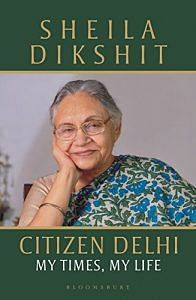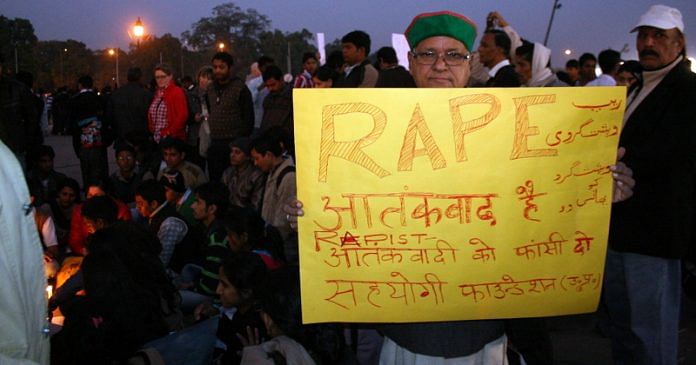In this excerpt from her autobiography, former Delhi Chief Minister Sheila Dikshit explains why she stayed on despite the fallout of the controversial 2012 incident.
Although we had started our third term on a high note, most of my time had been taken up by fire-fighting operations. That and the climate of suspicion that had been created around every move of our’s brought me to a pass where once again, in the summer of 2012, I was reluctant to continue as the Delhi Chief Minister.
Around that same time, there were rumours that I might get a berth in the Union Cabinet. Some senior leaders went so far as to indicate the Home Ministry portfolio, but I dismissed such talk, as I had no official communication to the effect. A long meeting with Mrs Sonia Gandhi in July had the rumour mills churning.
As for myself, I was looking for something new, a larger canvas perhaps. At that juncture, I did feel that I could have been of greater use at the Centre than as Chief Minister. In fact, the inadequate political management of the crises faced by UPA-2 reminded me of the time when the Rajiv Gandhi government too had not been able to politically manage the fallout of the Bofors crisis.
However, it was the then Power Minister, Sushil Kumar Shinde, who was moved to the Home Ministry. The fact that his elevation, which was perceived as a reward, came on the heels of a black-out in large parts of India in the second half of 2012, further dented the image of the Congress.
As the winter of 2012 approached, I was overcome with fatigue and bouts of breathlessness. The doctors confirmed a ninety per cent blockage in my right coronary artery, and I underwent my second angioplasty after 2006.
I felt it was time for me to step away from electoral politics. My family told me in no uncertain terms that I needed to put health concerns before everything else. My decision to resign was almost certain. Moreover, with a year to go for the assembly election, the party had enough time to find an alternative. I was ready to campaign, if required.
As I slowly recovered my strength and prepared to inform the high command of my decision to step down, Delhi, and India, was shaken to its core on 16 December. Twenty-three-year-old Nirbhaya, who was studying physiotherapy, was gang-raped and tortured by six men in a private bus that she had boarded with her friend, who too was beaten up mercilessly. Thrown out of the bus, they lay on the road when some good Samaritans came across them and took them to Safdarjung Hospital.
At a time when India was witnessing a rising graph of violent crimes against women, this one pierced the heart. A young educated girl from a modest background, standing at the threshold of a life she had made for herself, her only crime had been her self-confidence. I immediately called up senior officials in the Delhi government as well as police officers to get a sense of the situation.
While people of all ages took to the streets and held candle light vigils, their anger and anguish palpable in their eyes, our government appeared non-responsive. Even as I quietly reached out to Nirbhaya’s family to extend them every possible help, my statement that law and order did not fall within our government’s jurisdiction was viewed as being an insensitive attempt at passing the buck.
Never the less, it was not so. I too was a woman—moreover, a mother and a grandmother. In the last decade or so, the growing confidence of the young girls and women of my city had been my source of delight. It sickened me as a long-time resident of Delhi to see this face of the city.
I knew that the people who came to my house did so because they saw me as the face of Delhi. What should have been a moment for me to take charge of the situation was reduced to a moment of extreme frustration for the simple reason that law and order in Delhi was the Centre’s responsibility. Had the Union Home Ministry responded with urgency and addressed the Delhi police, the people would have realised whose call it was to initiate action and would have seen the concern expressed by the government. The Centre’s unresponsive stance immediately after the incident seemed deliberate as it shifted the focus entirely on the Delhi government.
I respected the anger of the people for I knew where it was coming from. As a woman, Chief Minister and a Congresswoman, I decided to go to Jantar Mantar to show my solidarity with the people who had gathered there, even though my officials had warned me that I might not be welcome. When I reached Jantar Mantar, I sensed some resistance to my presence, but no one abused me or tried to block my passage as I lit a candle for Nirbhaya. Sandeep’s car, however, was pelted with stones when he attempted to join the protest at India Gate.
I also met Nirbhaya’s friend. Hearing his account further firmed my resolve to help Nirbhaya and her family. I personally monitoring her situation day after day, our government arranged for her transfer to a hospital in Singapore. I approached the Union Home Minister and set up a meeting with the Chief Justice of the Delhi High Court to initiate fast-track courts.
On 29 December, Nirbhaya lost the battle for her life. For the family the loss of a dear one is irreparable. Our government extended its sympathy in the way it could, by providing financial support and helping her brother realise his ambition to be a pilot. I continue to be in touch with them.
By January 2013, the Justice Verma Committee, which had been tasked with recommending amendments to the criminal law to ensure speedier trial and enhanced punishment in cases of sexual assaults against women, had submitted its report to the Central government.
The preface of the report stated, ‘Failure of good governance is the obvious root cause for the current unsafe environment eroding the rule of law.’ It also mentioned an urgent need for police reforms as well as an attitudinal change in society ‘to correct the aberration of gender bias’.
By mid-March, both Houses of Parliament had passed the Criminal Law (Amendment) Bill, 2013. On 2 April 2013, President Pranab Mukherjee gave his consent to the Bill, and the Criminal Law (Amendment) Act, 2013, came into force. It occurred to me that the increasing violence, including sexual crimes, against women were taking place at a time when more and more of them were stepping out of their homes to pursue an education or a career, and were not lacking in self-confidence.
Moreover, the resurgence of patriarchal institutions like khap panchayats and growing instances of moral policing, signaled tough times ahead for women. The sheer randomness of the crime against Nirbhaya smote the hearts of old and young, men and women across cities, because she could have been anybody’s sister, daughter, granddaughter or girl friend. As newspapers and television channels show day after day, sexual crimes have not stopped, either in cities or in rural areas. Many do not even come to our notice.
At that juncture, like many other issues, this tragedy, too, was politicised for leverage and many a tear shed over the plight of women. However, that empathy for women has never found a corresponding echo in political parties when it comes to underrepresentation of women in Parliament. Whenever I raised the matter of having a larger number of women as election candidates, the discussions would invariably peter out. It was the same story in other parties as well. The ‘winnability’ factor was always forwarded as being the sole reason why women’s representation in Parliament was less than adequate.
After the Nirbhaya incident, I was in a bind. My family, which had seen my distress throughout that period, urged me to step down as planned earlier, but I felt that such a move would be seen as running away from the battlefield. The Centre had not wanted the blame to fall on it directly; and I, knowing well that our government would be blamed by the opposition, decided to take it on the chin. Someone had to take the blame.
 Citizen Delhi: My Times, My Life by Sheila Dikshit has been published by Bloomsbury. Excerpted with permission from Bloomsbury.
Citizen Delhi: My Times, My Life by Sheila Dikshit has been published by Bloomsbury. Excerpted with permission from Bloomsbury.




It’s unbelievable how dumb the headline sounds. Let’s enunciate this for you: A heinous rape was committed by a detestable bunch of men who also killed the woman. Neither Sheila Dixit nor Central Govt committed this crime. Any governments immediate responsibility is to catch the culprits and start a legal process of punishment. The long-term responsibility is to pass legislation on punitive and preventive measures. No justice system can blame a government for a rape (needing Dixit and central govt to keep passing blame), though govts are accountable for issues like street lighting, adequate policing, bus regulations, and important messaging that crimes against women will invite strongest punishment. The movement that picked in numbers was an immediate reaction to how heinous the crime was and the fact that the woman died of the attack. But if it was used politically, either by civil society or opposition or those within Congress, I m afraid India has only slaughtered the scapegoat and done little to prevent repeats. India is now known across the world as Rape capital of the world. Delhi’s rape statistics since change of government might remain the same or increase even. But the only request to politicians in these cases: 1. Don’t utter stupid, insensitive quotes 2. Don’t blame government and think it’s end of your responsibility. 3. See the legal cases to their logical conclusion. 4. Accept India has a massive rape problem and continue working on legislation. 5. To Print: we know you are looking for dirt on Congress. Shows in your headlines. Kindly focus on systems that could bring the numbers down. Delhi has a massive problem. Put your bright brains to use to solve that. Don’t play petty politics and cherry pick quotes on a serious issue like rape. 6. To ms Dikshit: the woman died. She copped the worst of this. No chief minister, no prime minister needs to pass the buck or resent taking responsibility. Your responsibility was to bring them to book. As long as you are clear you did everything to prevent more cases, your conscience should be clear.